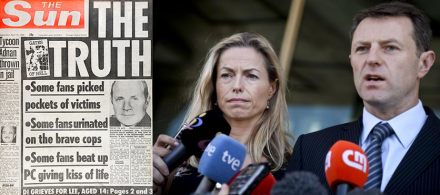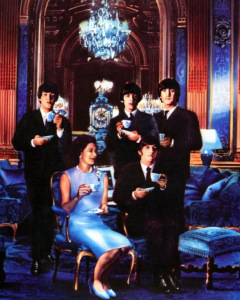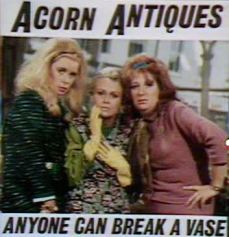 Although a keen amateur scholar of British history, it had never previously occurred to me that Edward I was into Zionism. Think about, though – he issued the notorious Edict of Expulsion in 1290, a royal decree that expelled all Jews from England. It wasn’t revoked until one of Edward’s successors four-hundred years later lost his head; it took a commoner to take control of the country before Jews were permitted to return to these shores – yes, Oliver Cromwell. He wasn’t all bad, see. Mind you, neither was Hitler, of course; he built the autobahns, didn’t he? And, according to the latest historical revelations courtesy of Ken Livingstone, old Adolf was keen on the Zionist thing himself, due to the fact that he wanted the Jews of Germany to relocate en masse to the Holy Land. He hadn’t hatched the Final Solution at this point, so he was still clearly a reasonable and rational man.
Although a keen amateur scholar of British history, it had never previously occurred to me that Edward I was into Zionism. Think about, though – he issued the notorious Edict of Expulsion in 1290, a royal decree that expelled all Jews from England. It wasn’t revoked until one of Edward’s successors four-hundred years later lost his head; it took a commoner to take control of the country before Jews were permitted to return to these shores – yes, Oliver Cromwell. He wasn’t all bad, see. Mind you, neither was Hitler, of course; he built the autobahns, didn’t he? And, according to the latest historical revelations courtesy of Ken Livingstone, old Adolf was keen on the Zionist thing himself, due to the fact that he wanted the Jews of Germany to relocate en masse to the Holy Land. He hadn’t hatched the Final Solution at this point, so he was still clearly a reasonable and rational man.
It was interesting that all was quiet on the Corbyn Army front yesterday. For a moment, I was wondering if we were seeing the return of the old far-left wall of silence when confronted by an uncomfortable truth – y’know, the same state of denial that had been a convenient patch of sand for burying heads in when news of Stalin’s purges exposed the realities of Soviet Communism to the western left in the 30s. Time was evidently required to come up with an explanation, and it’s been tweeted today. Ken claims it’s all a smear campaign generated by a Tory press who’ve always had it in for him. Yes, Ken; you can’t possibly be held responsible for what you said. Oh, get real. This is the same Mr Livingstone, I presume, who compared a Jewish ‘Evening Standard’ reporter to an officer of the SS a few years back.
Ken Livingstone had supposedly leapt to the defence of under-fire Labour MP Naz Shah, whose ill-advised online comments about Israel from a couple of years ago – aired before she was elected to Westminster – resurfaced and forced her into issuing an apology in the Commons. Ms Shah had denied she was anti-Semitic in her apology and appeared to have adhered to every rule of parliamentary penance in the process. She didn’t really need Ken weighing in with his limited grasp of history, and his clumsy intervention has now resulted in his own suspension from the party, pending an internal investigation.
It is true that Tory sections of the press dislike Ken Livingstone; he embodies so much of precisely what they hate in the left. Mind you, he’s hardly universally beloved in the Labour Party, many believing he represents everything that will keep them out of office. The problem is that the party in now in the hands of those who think along Ken lines; his old backbench buddy Jezza is the bloody leader, for God’s sake, and bringing Ken into the fold was bound to cause ructions at some point. He does have a history of putting his foot in it.
Zac Goldsmith, the clueless Hooray Henry that the Tories have chosen to run for London Mayor, has been equally dim with some of the moves he’s made in his campaign, but Goldsmith doesn’t masquerade as a man of the people, so it’s really no great surprise. Ken Livingstone, along with the shower that have seized the Labour frontbench, does pose as ‘an ordinary bloke’, but the wing of the party he belongs to is essentially the yang to David Cameron’s yin. Iain Duncan Smith in his resignation letter claimed the Conservative Cabinet have no interest in those who don’t vote Tory; Ken Livingstone and his ilk have no interest in those who don’t belong to a perceived ‘persecuted minority’.
Naturally, any mini-crisis that engulfs one political party will be exploited by another for political gain, though it would be unwise for Tories to adopt a holier-than-thou attitude to this. It was only last year that Dave referred to Syrian asylum-seekers as a ‘swarm’ – before the body of a little boy was photographed washed-up on a beach, of course; and the pro-Rhodesia/Apartheid South Africa policy of the old Monday Club would be an unpleasant skeleton in any party’s closet. However, the problem of anti-Semitism within Labour is especially acute in that much of it emanates from the ‘grass roots’ level, that of student bodies and the Momentum group, i.e. the very people that propelled the incumbent Labour leadership to power. Amusing it may have been, but Labour MP John Mann’s theatrical confrontation with Ken before TV cameras yesterday was a mere sideshow to the real problem, much of which stems from Labour’s enthusiastic embrace of Islam and fear of offending its less palatable prejudices.
The need to be viewed as inclusive and eager to recruit from the largest immigrant communities within the UK is a hallmark of modern Labour principles, yet one that turns a blind eye to some attitudes and opinions that, were they to emanate from white lips, would be instantly condemned. The introduction of Blair’s faith-schools in the late 90s served to foster separatism and suspicion and put the brakes on integration for a generation that has come of age with an Us and Them philosophy; by ghettoising a community, Labour has created a climate that can foster anti-Semitism at best and radicalisation at worst. Not that any of Corbyn’s crowd would acknowledge this.
To hear that loathsome bully boy Tom Watson describing Ken Livingstone’s comments as though they were most despicable remarks ever to have been uttered by a member of his own party is rich when one recalls his own rumour-mongering tirade against the dying Leon Brittan a couple of years ago. But perhaps Corbyn’s blinkered team have belatedly realised this unedifying scenario is something that threatens to expose their sham opposition and are desperate to minimise the damage while they can.
If being anti-Zionist does not equate with anti-Semitism, then criticising Corbyn and Ken does not equate with a deep desire to suck Cameron’s toes. I just wish there were separate pots for them all to piss in, for it often seems Westminster provides just the one.
© The Editor

 By now, we’re all familiar with the canny political tactic of burying bad news while headlines are claimed by more upbeat events; but on a day when anti-Semitism in the Labour Party has led to two high-profile suspensions, some good news has been relegated to the footnote of bulletins. The news? Well, the Royal College of Physicians has declared e-cigarettes a positive aid in stopping smoking the real thing. Despite the familiar bullying and propaganda of the anti-tobacco lobby, the men whose day-job it is to study the health of the nation have found the spurious claims made by those who want to outlaw anything that remotely resembles a fag are bollocks. Most of us resistant to the finger-wagging war on personal freedoms already knew so, but it’s nice that the professionals have issued official confirmation.
By now, we’re all familiar with the canny political tactic of burying bad news while headlines are claimed by more upbeat events; but on a day when anti-Semitism in the Labour Party has led to two high-profile suspensions, some good news has been relegated to the footnote of bulletins. The news? Well, the Royal College of Physicians has declared e-cigarettes a positive aid in stopping smoking the real thing. Despite the familiar bullying and propaganda of the anti-tobacco lobby, the men whose day-job it is to study the health of the nation have found the spurious claims made by those who want to outlaw anything that remotely resembles a fag are bollocks. Most of us resistant to the finger-wagging war on personal freedoms already knew so, but it’s nice that the professionals have issued official confirmation. Timing counts for a lot, even if timing takes time. On the day a verdict was finally reached in the Hillsborough Inquest and the pitiful reputation of the South Yorkshire Police Force was dragged even deeper into the dirt, another law enforcement outfit with a similarly tarnished record, the Metropolitan Police Force, announced it was poised to wind down the investigation into the disappearance of Madeleine McCann. It was as far back as April 1989 when 96 football fans lost their lives at Sheffield Wednesday’s ground; it was in 2007 when the four-year-old vanished without a trace from her family’s holiday hotel in Portugal. Neither case shares much other than the amount of headlines they have generated and the fact that both have threatened to challenge ‘The Mousetrap’ for longevity – nine years for Madeleine McCann and a staggering 27 for Hillsborough.
Timing counts for a lot, even if timing takes time. On the day a verdict was finally reached in the Hillsborough Inquest and the pitiful reputation of the South Yorkshire Police Force was dragged even deeper into the dirt, another law enforcement outfit with a similarly tarnished record, the Metropolitan Police Force, announced it was poised to wind down the investigation into the disappearance of Madeleine McCann. It was as far back as April 1989 when 96 football fans lost their lives at Sheffield Wednesday’s ground; it was in 2007 when the four-year-old vanished without a trace from her family’s holiday hotel in Portugal. Neither case shares much other than the amount of headlines they have generated and the fact that both have threatened to challenge ‘The Mousetrap’ for longevity – nine years for Madeleine McCann and a staggering 27 for Hillsborough. Automatic doors that open and close when we enter and exit shops are so commonplace now that it’s easy to forget what a novelty they once were. The first such doors I ever encountered were in the mid-70s and in Huddersfield, of all places. I remember stepping in and out of the premises over and over again just to experience the sensation which seemed to me straight out of the USSS Enterprise. The shop in question was British Home Stores. A year or two later, a brand new ‘shopping precinct’ (as they used to be called) emerged on Boar Lane in Leeds, complete with a bizarre plastic tube housing an outdoor escalator that again seemed to have arrived directly from a sci-fi show. The main shop at the forefront of this futuristic retail behemoth was British Home Stores. One of my first forays into it revealed they even had a record department. Those were, indeed, the days.
Automatic doors that open and close when we enter and exit shops are so commonplace now that it’s easy to forget what a novelty they once were. The first such doors I ever encountered were in the mid-70s and in Huddersfield, of all places. I remember stepping in and out of the premises over and over again just to experience the sensation which seemed to me straight out of the USSS Enterprise. The shop in question was British Home Stores. A year or two later, a brand new ‘shopping precinct’ (as they used to be called) emerged on Boar Lane in Leeds, complete with a bizarre plastic tube housing an outdoor escalator that again seemed to have arrived directly from a sci-fi show. The main shop at the forefront of this futuristic retail behemoth was British Home Stores. One of my first forays into it revealed they even had a record department. Those were, indeed, the days. That the final visit to British shores of President Obama as leader of ‘the free world’ should fall on a weekend when our nation marks the 400th anniversary of its greatest writer’s passing is one of those neat strokes of fate, coming at a moment when the country is perched perilously on the crossroads between alleged integration and alleged isolation. Obama’s unsurprising pro-EU stance, whether his sentiments were given a canny nudge by Dave or not, have proved to be a sly stroke on the part of the Remain camp; regardless of his fairly unremarkable record in his day-job, Obama is a popular figure here, and no amount of crying foul play by the Brexit bunch will really alter that.
That the final visit to British shores of President Obama as leader of ‘the free world’ should fall on a weekend when our nation marks the 400th anniversary of its greatest writer’s passing is one of those neat strokes of fate, coming at a moment when the country is perched perilously on the crossroads between alleged integration and alleged isolation. Obama’s unsurprising pro-EU stance, whether his sentiments were given a canny nudge by Dave or not, have proved to be a sly stroke on the part of the Remain camp; regardless of his fairly unremarkable record in his day-job, Obama is a popular figure here, and no amount of crying foul play by the Brexit bunch will really alter that. I didn’t think I’d have to do this just 48 hours after giving honourable mention to Victoria Wood, but this year doesn’t give me much choice. So, let’s go back to 1988, eh? The history books will tell you everyone under 30 was digesting E for breakfast and spending all day and night raving away in a derelict warehouse. Of course, that was 1988 for some, but very much a minority, just as the Roxy club had played host to a minority in 1977 and the UFO club had done likewise in 1967. In 1988 I was still entombed in a bedroom at my mother’s house, surrounded by own mini-gallery of pop cultural icons; most were of a generation before my time, as by this late stage the 80s had petered out into a dreary wasteland with Goths at one end and Stock Aitken and Waterman at the other, and not a lot to get excited about in the middle.
I didn’t think I’d have to do this just 48 hours after giving honourable mention to Victoria Wood, but this year doesn’t give me much choice. So, let’s go back to 1988, eh? The history books will tell you everyone under 30 was digesting E for breakfast and spending all day and night raving away in a derelict warehouse. Of course, that was 1988 for some, but very much a minority, just as the Roxy club had played host to a minority in 1977 and the UFO club had done likewise in 1967. In 1988 I was still entombed in a bedroom at my mother’s house, surrounded by own mini-gallery of pop cultural icons; most were of a generation before my time, as by this late stage the 80s had petered out into a dreary wasteland with Goths at one end and Stock Aitken and Waterman at the other, and not a lot to get excited about in the middle. A royal record is poised to be broken, though unlike the publicity afforded Queen Elizabeth II’s overtaking of Queen Victoria last September, this one ‘officially’ doesn’t count and probably won’t get much in the way of coverage. Brenda may turn 90 today, solidifying her position as the oldest sovereign Britain has ever had; but if she makes it to May 11, she will have surpassed the titular reign of James III, the reign that never was. History knows him as The Old Pretender, but the King across the Water was never crowned, his birth as a Catholic heir leading to the Glorious Revolution of 1688. To those loyal to the Jacobite cause, James Francis Edward Stuart was always recognised as the legitimate King of England, Scotland and Ireland, and as such reigned in a parallel universe for 64 years.
A royal record is poised to be broken, though unlike the publicity afforded Queen Elizabeth II’s overtaking of Queen Victoria last September, this one ‘officially’ doesn’t count and probably won’t get much in the way of coverage. Brenda may turn 90 today, solidifying her position as the oldest sovereign Britain has ever had; but if she makes it to May 11, she will have surpassed the titular reign of James III, the reign that never was. History knows him as The Old Pretender, but the King across the Water was never crowned, his birth as a Catholic heir leading to the Glorious Revolution of 1688. To those loyal to the Jacobite cause, James Francis Edward Stuart was always recognised as the legitimate King of England, Scotland and Ireland, and as such reigned in a parallel universe for 64 years. Well, at least all the right boxes have been ticked now. The election of Malia Bouattia as the new President of the National Union of Students is the perfect appointment. Female – tick; black – tick; Muslim – tick; Pro-Palestine – tick; Anti-Semitic – tick. Whoops, slight error there; I meant to say Anti-Zionist, which has nothing remotely to do with Anti-Semitism, of course. It’s cool to be Anti-Zionist, just as it apparently is in some circles to be pro-ISIS; not that I’m suggesting Ms Bouattia is, naturally. It’s just that publicly rejecting a motion put forward by her fellow students two years ago to condemn ISIS activities does suggest she’s not entirely opposed to the methods some adopt to cope with the ‘Zionist’ problem.
Well, at least all the right boxes have been ticked now. The election of Malia Bouattia as the new President of the National Union of Students is the perfect appointment. Female – tick; black – tick; Muslim – tick; Pro-Palestine – tick; Anti-Semitic – tick. Whoops, slight error there; I meant to say Anti-Zionist, which has nothing remotely to do with Anti-Semitism, of course. It’s cool to be Anti-Zionist, just as it apparently is in some circles to be pro-ISIS; not that I’m suggesting Ms Bouattia is, naturally. It’s just that publicly rejecting a motion put forward by her fellow students two years ago to condemn ISIS activities does suggest she’s not entirely opposed to the methods some adopt to cope with the ‘Zionist’ problem. Not acknowledging every notable passing on here has become necessary this year in order to prevent the blog being a permanent roll-call of celebrity obituaries. The death of Victoria Wood from cancer at the age of 62, however, I feel is worth noting. At the height of the Alternative Comedy craze in the middle of the 80s, she was something of a curious anomaly. Her BBC2 series of the time, ‘Victoria Wood As Seen on TV’, didn’t naturally sit alongside the likes of ‘The Young Ones’, but the fact it was positioned outside of the zeitgeist has given some aspects of it, particularly the superb soap parody ‘Acorn Antiques’, a timeless appeal on a par with Morecambe and Wise.
Not acknowledging every notable passing on here has become necessary this year in order to prevent the blog being a permanent roll-call of celebrity obituaries. The death of Victoria Wood from cancer at the age of 62, however, I feel is worth noting. At the height of the Alternative Comedy craze in the middle of the 80s, she was something of a curious anomaly. Her BBC2 series of the time, ‘Victoria Wood As Seen on TV’, didn’t naturally sit alongside the likes of ‘The Young Ones’, but the fact it was positioned outside of the zeitgeist has given some aspects of it, particularly the superb soap parody ‘Acorn Antiques’, a timeless appeal on a par with Morecambe and Wise. Perhaps it’s just my insatiable imagination working overtime, but I often view the Fleet Street family as just that; a dysfunctional family at times, but the same could be said of the Forsytes, and it was this very factor that made their story such an entertaining saga. A combination of readership and editorial serve to shape the character of each individual member of the Fleet Street family, who are united as much as they are divided. The complex relationships between the various members are ones of love and hate, comradeship and contempt, and romance and rivalry. Like any family, petty grievances are only ever put aside when the entire dynasty is under attack; they close ranks and confront the common enemy as one intimidating unit. As if to underline this, they maintain their name despite having vacated their crumbling old home and relocated to a modern luxury residence in Wapping.
Perhaps it’s just my insatiable imagination working overtime, but I often view the Fleet Street family as just that; a dysfunctional family at times, but the same could be said of the Forsytes, and it was this very factor that made their story such an entertaining saga. A combination of readership and editorial serve to shape the character of each individual member of the Fleet Street family, who are united as much as they are divided. The complex relationships between the various members are ones of love and hate, comradeship and contempt, and romance and rivalry. Like any family, petty grievances are only ever put aside when the entire dynasty is under attack; they close ranks and confront the common enemy as one intimidating unit. As if to underline this, they maintain their name despite having vacated their crumbling old home and relocated to a modern luxury residence in Wapping. So, there I was – broom at the ready, waiting for the call that never came. It was five years ago and I was eager to sign-up for the Big Society. Would I be sweeping someone else’s dry sick away from the pavement, my head proudly sporting a paper hat with David Cameron’s face on it as an advert for my gullible stupidity? I was ready to volunteer to do something soul-destroying for free, eschewing the payment demanded by those council workers who at least fulfilled the state’s obligation to do its dirty work in exchange for a fee. And now, half-a-decade later, I’m furtively fixated on the letter box for a sight of the government’s explanation on why leaving the EU wouldn’t be a good idea. I’m sure it’ll be a concise and honest document that nobody could dispute the facts of.
So, there I was – broom at the ready, waiting for the call that never came. It was five years ago and I was eager to sign-up for the Big Society. Would I be sweeping someone else’s dry sick away from the pavement, my head proudly sporting a paper hat with David Cameron’s face on it as an advert for my gullible stupidity? I was ready to volunteer to do something soul-destroying for free, eschewing the payment demanded by those council workers who at least fulfilled the state’s obligation to do its dirty work in exchange for a fee. And now, half-a-decade later, I’m furtively fixated on the letter box for a sight of the government’s explanation on why leaving the EU wouldn’t be a good idea. I’m sure it’ll be a concise and honest document that nobody could dispute the facts of.